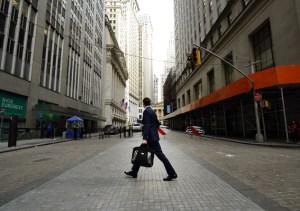We Are OK: New Technology and Existing Resources Are Allowing Sandy’s Victims to Avoid Subleasing
By Al Barbarino November 20, 2012 7:00 am
reprintsOn Thursday, Nov. 1, Virgo Business Centers made 27,321 square feet of temporary, furnished office space available at 14 Penn Plaza. Companies displaced by Hurricane Sandy filed in one by one, and by the following Thursday, the space was full.
“Typically, that process takes about a year,” said Pasha Erkin, director of sales at the company. “It’s all about readiness. You could literally bring me 40 people today, and I could have the space ready tomorrow. All you have to do is walk in, flip on a switch, plug in and start working.”
In that building alone, the company took on 177 employees from displaced companies like Coronet, amfAR, Linda Decorato, Ambrose and others located on the eastern tip of Downtown and other areas hit hard by the hurricane.

The company offers furnished space for stays as short as one month for between $1,200 and $5,000 per month, depending on the size of the office space. Companies offering plug-and-play access to furnished office space without the commitment of a traditional lease have fared well post-Sandy.
They offer just one of the alternatives to subleasing that, in many ways, will put a damper on the hopes of companies with extra space, as displaced companies, many of which have lease obligations that will resume once buildings reopen, avoid signing into complicated agreements, experts told The Commercial Observer.
With 37 of 183 buildings in Lower Manhattan remaining closed as of Nov. 12, according to data from Jones Lang LaSalle, the reality of the situation is that more and more companies will not be able to return to their offices for weeks or even months.
But the technologies and existing resources major companies have in place are allowing them to avoid subleasing, in some cases by operating from company-owned offices elsewhere in the city or remotely, and with strikingly little impact on normal operations, said Chris Caltabiano, an adjunct professor at NYU Schack.
“I don’t think the sublease space is being significantly affected, because it just doesn’t make sense,” Mr. Caltabiano said, who added that companies with extra space may find their hopes somewhat blunted. “I think they were looking for opportunities to move some of this space, but I think they realized that in this short-term situation a lot of companies are looking to use technology and other resources to ride it out.”


